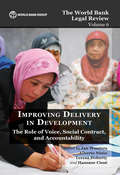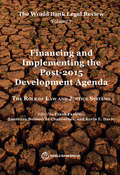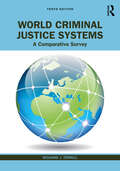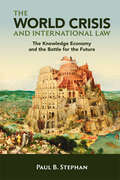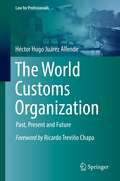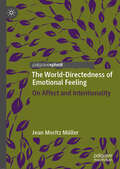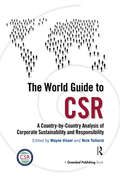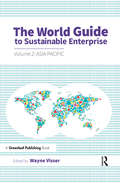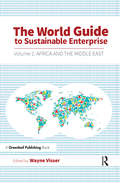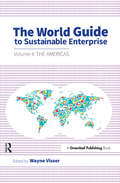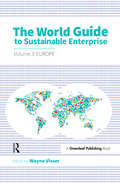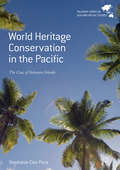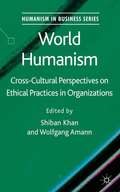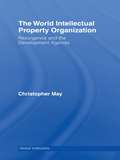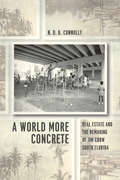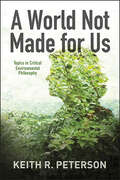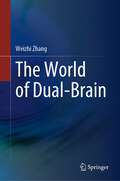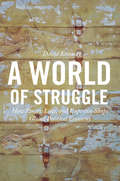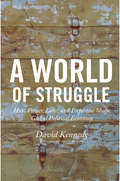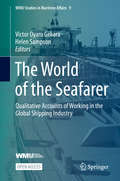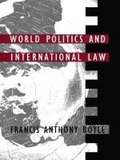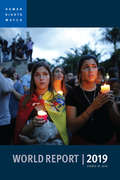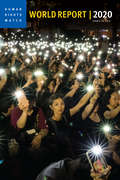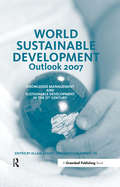- Table View
- List View
The World Bank Legal Review Volume 6 Improving Delivery in Development
by Alberto Ninio Teresa Doherty Cisse' Jan WoutersMany developing countries have the capacity to develop broad development policy directions and formulate development programs that are logical and consistent, but these do not obtain the desired or targeted results because of challenges in the delivery system. It is increasingly apparent that development efforts must be carefully crafted and targeted in the right way to achieve the most effective results in an efficient manner. Recent literature in development studies evidence the important role of 'delivery' in actualizing positive and efficient development impact. Improving delivery and development impact requires a multidisciplinary approach. Development practitioners devoted to rule of law and justice must conjoin their efforts, concepts, tools and knowledge with experts from various disciplines so as to shape a delivery system that adds economic and social value to ultimate beneficiaries of development. In the foregoing light, the book brings together the diverse perspectives of development experts, international lawyers, academics, researchers, legal practitioners, public and civil servants, and other professionals, in order to explore the values of voice, social contract and accountability, and thereby address the following issue: How can law and justice tools, concepts and knowledge - when anchored in values such as voice, social contract and accountability - shape a delivery system that adds economic and social value to ultimate beneficiaries of development? The book revolves around a discussion of the three values of voice, social contract, and accountability as they relate to the role and function of law, rule of law, justice, judicial systems and other related areas, in delivering development impact. Additionally, the book departs from the legal and includes other multidisciplinary approaches in its discussion of the three values and their impact on delivery in development. The range of issues covered by the book include those relating to human rights, government policy, urban development, resource management, gender, social rights, economic reforms, financial empowerment, opportunity creation, governance, urban law, sustainable development and anti-corruption.
The World Bank Legal Review, Volume 7 Financing and Implementing the Post-2015 Development Agenda: The Role of Law and Justice Systems
by Kevin E. Davis Laurence Boisson de Chazournes Frank FarielloThe newly adopted post-2015 development agenda is centered on 17 sustainable development goals to be reached by 2030. This volume of the World Bank Legal Review looks at how law and justice systems can support the financing and implementation of these goals, including the role of the rule of law and economic and social rights. The contributors, including legal scholars, development practitioners, and financial experts, analyze the goals, explore ways in which they can be achieved, and examine ways that recent relevant law and justice programs have worked. A wide array of topics are covered, from the legal aspects of collecting and monitoring vital data, to improving legal identity programs, to creating innovative health care regulation, to legal and judicial reform, to providing private sector "financing of public education projects to the provision of global public goods. Additionally, a special section on Europe looks at financial crisis management, enforcement of court decisions and the workings of the European Court of Justice. The opportunities and challenges of the 2030 agenda are many. This volume looks at both from multiple perspectives, demonstrating how sustainable development can go forward in a way in which everyone benefits.
World Criminal Justice Systems: A Comparative Survey
by Richard J. TerrillThe revised tenth edition of this core textbook provides an understanding of major world criminal justice systems by discussing and comparing the systems of six of the world’s countries—each representative of a different type of legal system. England, France, Japan, South Africa, Russia, and China are all covered in detail, and an additional chapter on Islamic law uses three example nations to illustrate the range of practice within Sharia. Political, historical, organizational, procedural, and critical issues confronting the justice systems are explained and analyzed. Neatly organized with a parallel structure throughout the text, each chapter contains material on government, police, judiciary, law, corrections, juvenile justice, and other critical issues. A new feature of this text focuses on the nature of the political world order and the significant clash between some democratic and authoritarian governments. Of particular concern are those authoritarian governments that have seen the rise of what has been popularly referred to as the strongman leader. The countries covered in this text have seen the emergence of four such strongmen. While the rise of each occurred in different contexts, they were each facilitated in significant ways by the manner in which they asserted their control over the country’s criminal justice system. This book is suitable for undergraduate and graduate students in criminal justice, prelaw, and similar programs. Supplementary materials for instructors include test bank and lecture slides.
The World Crisis and International Law: The Knowledge Economy and the Battle for the Future
by Paul B. StephanThe knowledge economy, a seeming wonder for the world, has caused unintended harms that threaten peace and prosperity and undo international cooperation and the international rule of law. The world faces threats of war, pandemics, growing domestic political discord, climate change, disruption of international trade and investment, immigration, and the pollution of cyberspace, just as international law increasingly falls short as a tool for managing these challenges. Prosperity dependent on meritocracy, open borders, international economic freedom, and a wide-open Internet has met its limits, with international law one of the first casualties. Any effective response to these threats must reflect the pathway by which these perils arrive. Part of the answer to these challenges, Paul B. Stephan argues, must include a re-conception of international law as arising out of pragmatic and limited experiments by states, rather than as grand projects to remake and redeem the world.
The World Customs Organization: Past, Present and Future (Law for Professionals)
by Héctor Hugo Juárez AllendeThis book will take the reader through the past, the present, and into the future of the flagship institution of the international customs community: the World Customs Organization (WCO). The purpose is to present to the reader, in a comprehensive, orderly, and synthetic manner, the enormous contributions that this prestigious and recognized institution has been making to the secure growth of global international trade. In the development of the text, special consideration has been given to the relevant instruments in day-to-day customs work, which constitute the bases of the WCO (the Harmonized System Convention, the Revised Kyoto Convention, and the SAFE Framework of Standards, among many others), as well as those issues that are currently of specific interest to the global customs community (cross-border e-commerce, trade facilitation, and authorized economic operator, to mention but a few), trying to reconcile the various practical aspects of customs operations with their theoretical underpinnings. In the final part, the book turns to the future of customs, analyzing the most pressing challenges presented by technological advances, including the Internet of Things, artificial intelligence, 3D printing, and blockchain. In short, this book will be of great interest to all foreign trade operators, mainly to customs officials, customs brokers, carriers and international forwarding agents, managers of importing and exporting companies, as well as all those (professionals and students) who wish to deepen their knowledge of the exciting world of customs and international trade.
The World-Directedness of Emotional Feeling: On Affect and Intentionality
by Jean Moritz MüllerThis book engages with what are widely recognized as the two core dimensions of emotion. When we are afraid, glad or disappointed, we feel a certain way; moreover, our emotion is intentional or directed at something: we are afraid of something, glad or disappointed about something. Connecting with a vital strand of recent philosophical thinking, Müller conceives of these two aspects of emotion as unified. Examining different possible ways of developing the view that the feeling dimension of emotion is itself intentional, he argues against the currently popular view that it is a form of perception-like receptivity to value. Müller instead proposes that emotional feeling is a specific type of response to value, an affective ‘position-taking’. This alternative conceives of emotional feeling as intimately related to our cares and concerns. While situating itself within the analytic-philosophical debate on emotion, the discussion crucially draws on ideas from the early phenomenological tradition and thinks past the theoretical strictures of many contemporary approaches to this subject. The result is an innovative view of emotional feeling as a thoroughly personal form of engagement with value.
The World Guide to CSR: A Country-by-Country Analysis of Corporate Sustainability and Responsibility
by Wayne Visser Nick TolhurstThe World Guide to CSR is the first book to provide comparable national profiles that describe the evolution and practice of Corporate Sustainability and Responsibility (CSR) for 58 countries and 5 global regions. Each regional and national profile includes key information about the relevant CSR history, country-specific issues, trends, research and leading organizations. The purpose of the book is to give CSR professionals (including managers, consultants, academics and NGOs focusing on the social, environmental and ethical responsibilities of business) a quick reference guide to CSR in different regional and national contexts. The need for the book is premised on the fact that CSR professionals and researchers more often than not have a multinational remit and are required to benchmark performance internationally, but find that country-specific CSR information is ad hoc, limited or non-existent. Even where national CSR research exists, it is often hidden in academic journals that practitioners cannot access or do not have the time or inclination to read. The book is an edited volume, with expert contributors from around the world, all of whom have been screened and selected on the basis of their qualifications and experience in CSR. Each regional/country profile includes the following subsections:CSR in context Priority issues Trends Legislation and codes Organizations Case studies Educational institutions References This unique resource will be an essential acquisition for all organisations who need to benchmark their CSR strategies throughout different regions and cultures and want the best possible intelligence on the key issues and concerns relating to corporate social responsibility in all of the markets in which they operate.
The World Guide to Sustainable Enterprise: Volume 2: Asia Pacific
by Wayne VisserThe World Guide to Sustainable Enterprise is the first comprehensive global compendium that clearly describes the national approaches to sustainable enterprise. Through a systematic review of each country, this quick-to-access reference guide showcases the similarities and differences in each region. Every country profile includes key information about the relevant history, country-specific issues, trends, research, and the leading organizations operating in the field as well as best-practice case studies. The guide comprises four volumes, each dedicated to a specific region of the world. In a world where organizations are working increasingly across national and regional boundaries and research takes a joined-up and international approach, this book is an essential guide for practitioners and researchers in the disciplines of business sustainability, social enterprise and corporate responsibility. The first of its kind, this reference book provides the reader with a unique insight into what is the current state-of-play in each country. Each edited volume provides expert contributions from around the world; the contributors have been selected on the basis of their knowledge of the country and their clear experience in sustainable enterprise. Each regional/country profile includes the following subsections: Sustainable Enterprise in context; Priority issues; Trends; Government policies; Case studies; Further resources; and References. This unique resource will be an essential acquisition for all organizations who need to benchmark their sustainable enterprise strategies throughout different regions and cultures and want the best possible intelligence on the key issues and concerns relating to sustainable business and social responsibility in all of the markets in which they operate. It provides a useful companion reference collection to the World Guide to CSR, also edited by Wayne Visser. The full Four Volume Set of The World Guide to Sustainable Enterprise is available for purchase as a single item at a 25% discounted rate.
The World Guide to Sustainable Enterprise: Volume 1: Africa and Middle East
by Wayne VisserThe World Guide to Sustainable Enterprise is the first comprehensive global compendium that clearly describes the national approaches to sustainable enterprise. Through a systematic review of each country, this quick-to-access reference guide showcases the similarities and differences in each region. Every country profile includes key information about the relevant history, country-specific issues, trends, research, and the leading organizations operating in the field as well as best-practice case studies. The guide comprises four volumes, each dedicated to a specific region of the world. In a world where organizations are working increasingly across national and regional boundaries and research takes a joined-up and international approach, this book is an essential guide for practitioners and researchers in the disciplines of business sustainability, social enterprise and corporate responsibility. The first of its kind, this reference book provides the reader with a unique insight into what is the current state-of-play in each country. Each edited volume provides expert contributions from around the world; the contributors have been selected on the basis of their knowledge of the country and their clear experience in sustainable enterprise. Each regional/country profile includes the following subsections: Sustainable Enterprise in context; Priority issues; Trends; Government policies; Case studies; Further resources; and References. This unique resource will be an essential acquisition for all organizations who need to benchmark their sustainable enterprise strategies throughout different regions and cultures and want the best possible intelligence on the key issues and concerns relating to sustainable business and social responsibility in all of the markets in which they operate. It provides a useful companion reference collection to The World Guide to CSR, also edited by Wayne Visser. The full Four Volume Set of The World Guide to Sustainable Enterprise is available for purchase as a single item at a 25% discounted rate.
The World Guide to Sustainable Enterprise: Volume 4: the Americas
by Wayne VisserThe World Guide to Sustainable Enterprise is the first comprehensive global compendium that clearly describes the national approaches to sustainable enterprise. Through a systematic review of each country, this quick-to-access reference guide showcases the similarities and differences in each region. Every country profile includes key information about the relevant history, country-specific issues, trends, research, and the leading organizations operating in the field as well as best-practice case studies. The guide comprises four volumes, each dedicated to a specific region of the world. In a world where organizations are working increasingly across national and regional boundaries and research takes a joined-up and international approach, this book is an essential guide for practitioners and researchers in the disciplines of business sustainability, social enterprise and corporate responsibility. The first of its kind, this reference book provides the reader with a unique insight into what is the current state-of-play in each country. Each edited volume provides expert contributions from around the world; the contributors have been selected on the basis of their knowledge of the country and their clear experience in sustainable enterprise. Each regional/country profile includes the following subsections: Sustainable Enterprise in context; Priority issues; Trends; Government policies; Case studies; Further resources; and References. This unique resource will be an essential acquisition for all organizations who need to benchmark their sustainable enterprise strategies throughout different regions and cultures and want the best possible intelligence on the key issues and concerns relating to sustainable business and social responsibility in all of the markets in which they operate. It provides a useful companion reference collection to the World Guide to CSR, also edited by Wayne Visser. The full Four Volume Set of The World Guide to Sustainable Enterprise is available for purchase as a single item at a 25% discounted rate.
The World Guide to Sustainable Enterprise - Volume 3: Europe
by Wayne VisserThe World Guide to Sustainable Enterprise is the first comprehensive global compendium that clearly describes the national approaches to sustainable enterprise. Through a systematic review of each country, this quick-to-access reference guide showcases the similarities and differences in each region. Every country profile includes key information about the relevant history, country-specific issues, trends, research, and the leading organizations operating in the field as well as best-practice case studies. The guide comprises four volumes, each dedicated to a specific region of the world. In a world where organizations are working increasingly across national and regional boundaries and research takes a joined-up and international approach, this book is an essential guide for practitioners and researchers in the disciplines of business sustainability, social enterprise and corporate responsibility. The first of its kind, this reference book provides the reader with a unique insight into what is the current state-of-play in each country. Each edited volume provides expert contributions from around the world; the contributors have been selected on the basis of their knowledge of the country and their clear experience in sustainable enterprise. Each regional/country profile includes the following subsections: Sustainable Enterprise in context; Priority issues; Trends; Government policies; Case studies; Further resources; and References. This unique resource will be an essential acquisition for all organizations who need to benchmark their sustainable enterprise strategies throughout different regions and cultures and want the best possible intelligence on the key issues and concerns relating to sustainable business and social responsibility in all of the markets in which they operate. It provides a useful companion reference collection to the World Guide to CSR, also edited by Wayne Visser. The full Four Volume Set of The World Guide to Sustainable Enterprise is available for purchase as a single item at a 25% discounted rate.
World Heritage Conservation in the Pacific: The Case of Solomon Islands (Palgrave Series in Asia and Pacific Studies)
by Stephanie Clair PriceThis book explores the opportunities and challenges associated with the legal protection of World Heritage sites in the Pacific Islands. It argues that the small Pacific representation on the World Heritage List is in part due to a lack of strong legal frameworks for heritage conservation, putting such sites under threat. Providing a comprehensive analysis of the nomination, listing and protection of the Solomon Island World Heritage Site, it examines the implementation of the World Heritage Convention in the Pacific context. It explores how the international community’s broadening interpretation of the notion of ‘outstanding universal value’ has increased the potential for Pacific heritage to be classified as ‘World Heritage’. This book also analyses the protection regime established by the Convention, and the World Heritage Committee’s approach to heritage conservation, identifying challenges associated with the protection of Pacific Island heritage.
World Humanism
by Shiban Khan Wolfgang AmannThe purpose of World Humanism: Cross-cultural Perspectives on Ethical Practices in Organizations is to discover what is distinctive about humanistic management practices around the world. It examines the nature and occurrence of humanistic management practices within businesses and other organizations across the world.
World Intellectual Property Organization: Resurgence and the Development Agenda (Global Institutions)
by Christopher MayCovering the World Intellectual Property Organization, this volume introduces a much ignored element of the contemporary structure of global governance to scholars of international political economy. Christopher May discusses: how the World Intellectual Property Organization works, its antecedents and history the debates about the role and justification of intellectual property the role of WIPO within contemporary global politics the key elements of its relations with the World Trade Organization the Agreement on Trade Related Aspects of Intellectual Property Rights. The analysis then examines the recent political economy of the organization and argues that far from being the neutral or technical agency that it often presents itself as, the WIPO is highly politicized and acts to socialize policy makers and civil servants into a specific view of intellectual property. However, the recent proposal to establish a Development Agenda at the WIPO is an important development, and the book concludes by examining the problems which have promoted this agenda, suggesting that these reforms of the WIPO should be welcomed. The World Intellectual Property Organization is a clear and accessible volume that will confirm the WIPO as one of the global institutions which any student of global governance must understand.
A World More Concrete: Real Estate and the Remaking of Jim Crow South Florida
by N. D. B. ConnollyMany people characterize urban renewal projects and the power of eminent domain as two of the most widely despised and often racist tools for reshaping American cities in the postwar period. In A World More Concrete, N. D. B. Connolly uses the history of South Florida to unearth an older and far more complex story. Connolly captures nearly eighty years of political and land transactions to reveal how real estate and redevelopment created and preserved metropolitan growth and racial peace under white supremacy. Using a materialist approach, he offers a long view of capitalism and the color line, following much of the money that made land taking and Jim Crow segregation profitable and preferred approaches to governing cities throughout the twentieth century. A World More Concrete argues that black and white landlords, entrepreneurs, and even liberal community leaders used tenements and repeated land dispossession to take advantage of the poor and generate remarkable wealth. Through a political culture built on real estate, South Florida's landlords and homeowners advanced property rights and white property rights, especially, at the expense of more inclusive visions of equality. For black people and many of their white allies, uses of eminent domain helped to harden class and color lines. Yet, for many reformers, confiscating certain kinds of real estate through eminent domain also promised to help improve housing conditions, to undermine the neighborhood influence of powerful slumlords, and to open new opportunities for suburban life for black Floridians. Concerned more with winners and losers than with heroes and villains, A World More Concrete offers a sober assessment of money and power in Jim Crow America. It shows how negotiations between powerful real estate interests on both sides of the color line gave racial segregation a remarkable capacity to evolve, revealing property owners' power to reshape American cities in ways that can still be seen and felt today.
A World More Concrete: Real Estate and the Remaking of Jim Crow South Florida
by N. D. B. ConnollyMany people characterize urban renewal projects and the power of eminent domain as two of the most widely despised and often racist tools for reshaping American cities in the postwar period. In A World More Concrete, N. D. B. Connolly uses the history of South Florida to unearth an older and far more complex story. Connolly captures nearly eighty years of political and land transactions to reveal how real estate and redevelopment created and preserved metropolitan growth and racial peace under white supremacy. Using a materialist approach, he offers a long view of capitalism and the color line, following much of the money that made land taking and Jim Crow segregation profitable and preferred approaches to governing cities throughout the twentieth century. A World More Concrete argues that black and white landlords, entrepreneurs, and even liberal community leaders used tenements and repeated land dispossession to take advantage of the poor and generate remarkable wealth. Through a political culture built on real estate, South Florida's landlords and homeowners advanced property rights and white property rights, especially, at the expense of more inclusive visions of equality. For black people and many of their white allies, uses of eminent domain helped to harden class and color lines. Yet, for many reformers, confiscating certain kinds of real estate through eminent domain also promised to help improve housing conditions, to undermine the neighborhood influence of powerful slumlords, and to open new opportunities for suburban life for black Floridians. Concerned more with winners and losers than with heroes and villains, A World More Concrete offers a sober assessment of money and power in Jim Crow America. It shows how negotiations between powerful real estate interests on both sides of the color line gave racial segregation a remarkable capacity to evolve, revealing property owners' power to reshape American cities in ways that can still be seen and felt today.
A World Not Made for Us: Topics in Critical Environmental Philosophy (SUNY series in Environmental Philosophy and Ethics)
by Keith R. PetersonIn A World Not Made for Us, Keith R. Peterson provides a broad reassessment of the field of environmental philosophy, taking a fresh and critical look at three classical problems of environmentalism: the intrinsic value of nature, the need for an ecological worldview, and a new conception of the place of humankind in nature. He makes the case that a genuinely critical environmental philosophy must adopt an ecological materialist conception of the human, a pluralistic value theory that emphasizes the need for value prioritization, and a stratified categorial ontology that affirms the basic principle of human asymmetrical dependence on more-than-human nature. Integrating environmental ethics with the latest work in political ecology, Peterson argues it is important to understand that the world is not made for us, and that coming to terms with this fact is a condition for survival in future human and more-than-human communities of liberation and solidarity.
The World of Dual-Brain
by Weizhi ZhangThis book leaves the template of the inertia of natural human society and traditional ideological thinking, to illustrate the mechanism of the generation of the Sociality Brain and to explore the construction path of the human-computer symbiosis order. At the same time, this book proposes concepts including ‘wisdom sharing system’, ‘the Sociality Brain’, ‘dual-brain world’, ‘off-site economic civilization’, ‘basic contradictions in the intelligent world’, and ‘class analysis and division of the dual-brain world’, etc. This is a philosophical thinking about the intelligent world beyond the categories of natural human society and biological brain.
A World of Struggle
by David KennedyA World of Struggle reveals the role of expert knowledge in our political and economic life. As politicians, citizens, and experts engage one another on a technocratic terrain of irresolvable argument and uncertain knowledge, a world of astonishing inequality and injustice is born.In this provocative book, David Kennedy draws on his experience working with international lawyers, human rights advocates, policy professionals, economic development specialists, military lawyers, and humanitarian strategists to provide a unique insider's perspective on the complexities of global governance. He describes the conflicts, unexamined assumptions, and assertions of power and entitlement that lie at the center of expert rule. Kennedy explores the history of intellectual innovation by which experts developed a sophisticated legal vocabulary for global management strangely detached from its distributive consequences. At the center of expert rule is struggle: myriad everyday disputes in which expertise drifts free of its moorings in analytic rigor and observable fact. He proposes tools to model and contest expert work and concludes with an in-depth examination of modern law in warfare as an example of sophisticated expertise in action.Charting a major new direction in global governance at a moment when the international order is ready for change, this critically important book explains how we can harness expert knowledge to remake an unjust world.
A World of Struggle: How Power, Law, and Expertise Shape Global Political Economy
by David KennedyA World of Struggle reveals the role of expert knowledge in our political and economic life. As politicians, citizens, and experts engage one another on a technocratic terrain of irresolvable argument and uncertain knowledge, a world of astonishing inequality and injustice is born.In this provocative book, David Kennedy draws on his experience working with international lawyers, human rights advocates, policy professionals, economic development specialists, military lawyers, and humanitarian strategists to provide a unique insider's perspective on the complexities of global governance. He describes the conflicts, unexamined assumptions, and assertions of power and entitlement that lie at the center of expert rule. Kennedy explores the history of intellectual innovation by which experts developed a sophisticated legal vocabulary for global management strangely detached from its distributive consequences. At the center of expert rule is struggle: myriad everyday disputes in which expertise drifts free of its moorings in analytic rigor and observable fact. He proposes tools to model and contest expert work and concludes with an in-depth examination of modern law in warfare as an example of sophisticated expertise in action.Charting a major new direction in global governance at a moment when the international order is ready for change, this critically important book explains how we can harness expert knowledge to remake an unjust world.
The World of the Seafarer: Qualitative Accounts of Working in the Global Shipping Industry (WMU Studies in Maritime Affairs #9)
by Victor Oyaro Gekara Helen SampsonThis open access book constitutes an ethnographic mosaic which depicts the contextual complexities of the life and work of seafarers who are employed in the international merchant cargo fleet. The collection is based upon the observations and interviews of researchers in multiple disciplines. It is woven together to offer a richly detailed insight into the ways in which a complex global industry operates internationally. The book covers issues to do with career decisions and recruitment, gender, life and work on board multinational vessels, health and safety issues, the regulation of the industry, shipboard roles and role conflict, and the representation of workers. It will be of considerable interest to all students globally who are studying for professional seafaring qualifications, to graduate students studying for masters courses in ship and port management, and to welfare professionals and policy makers. It is of special interest to those connected to the shipping industry who specialize in issues relating to 'the human element' and will serve as a paradigm defining text in this area.
World Politics and International Law
by Francis Anthony BoyleThis work tries to bridge the gap between international lawyers and those political scientists who write about international politics. In the first part, the author discusses the influence of Professor Morgenthau's realist school on the current thinking of political scientists and the abandonment of this school by its originator in the last years of his life. The author concludes that the best way to test the validity of different approaches is to discuss various international crises in the light of contrasting theories and to analyze each situation from both the legal and political points of view. In particular, he tries to ascertain to what extent vital national interests could be accommodated within an international legal framework, or could require a distortion of international rules in order to achieve national objectives. In the second part, the author dissects the Entebbe raid, where Israeli forces rescued a group of hostages being detained by hijackers at a Ugandan airport. His analysis shows the deficiencies of the international system in dealing with such a complex issue, where several contradictory principles of international law could be applied and were defended by various protagonists. The third part starts with a parallel problem--the Iranian hostages crisis, where a group of U.S. officials found themselves in an unprecedented situation of being captured by a band of students. A critical analysis of the handling of this problem by the Carter Administration is followed by vignettes of other crises faced by the Administration and by its successor, the Reagan Administration. This part is less analytical and more prescriptive. The author is no long satisfied with pointing out what went wrong; instead, he departs from the usual hands-off policy of political scientists and tries to indicate how much better each situation could have been handled if the decision makers had been paying more attention to international law and international organizations. The theme is slowly developed that in the long run national interest is better served not by practicing power politics and relying on the use of threat of force but by strengthening those international institutions that can provide a neutral environment for first slowing down a crisis and then finding an equitable solution acceptable to most of the parties in conflict.
World Report 2019: Events of 2018
by Human Rights WatchThe best country-by-country assessment of human rights. The human rights records of more than ninety countries and territories are put into perspective in Human Rights Watch's signature yearly report. Reflecting extensive investigative work undertaken by Human Rights Watch staff, in close partnership with domestic human rights activists, the annual World Report is an invaluable resource for journalists, diplomats, and citizens, and is a must-read for anyone interested in the fight to protect human rights in every corner of the globe.
World Report 2020: Events of 2019
by Human Rights WatchThe best country-by-country assessment of human rights.The human rights records of more than ninety countries and territories are put into perspective in Human Rights Watch's signature yearly report. Reflecting extensive investigative work undertaken by Human Rights Watch staff, in close partnership with domestic human rights activists, the annual World Report is an invaluable resource for journalists, diplomats, and citizens, and is a must-read for anyone interested in the fight to protect human rights in every corner of the globe.
World Sustainable Development Outlook 2007: Knowledge Management and Sustainable Development in the 21st Century (World Sustainable Development Outlook Ser.)
by Allam AhmedThe World Sustainable Development Outlook series has been developed to provide an overview of sustainable development, to discuss why it is important and to provoke forward thinking on the development of a more coherent approach to solving global problems related to sustainability through science and technology. In doing so, a holistic approach is used to critically examine the interrelationship between the natural, governmental, economic and social dimensions of our world and how science and technology can contribute to solutions. This is a truly global source book, which is reflected in the varied national and cultural origins of the contributors, as well as the topics and case studies covered. Each year a different theme will be covered. The theme of World Sustainable Development Outlook 2007 is the different dimensions of knowledge and technology management in the new era of information revolution and how they relate to sustainable development. Rapid innovation in information and communication technologies (ICTs) is clearly reshaping the world we live in. Countries are increasingly judged by whether they are information-rich or information-poor. It is estimated that 30–40% of the world's economic growth and 40–50% of all new jobs will be IT-driven. Education and knowledge are the chief currencies of the modern age, and can also be a strategic resource and a lifeline for sustainable development. Yet, in Africa, millions of people have never made a telephone call. The technological gulf between developed and developing countries (DCs) is likely to widen further with the rapid expansion of the internet and the speedy transition to digitalisation in the West. The impacts on DCs may include an increase in the so-called brain drain and growing dependence on foreign aid of a different kind – knowledge aid. There are fears that knowledge imperialism is already with us. What is clear is that most of the technological innovations in ICTs are Western-designed and fail to address the needs of the most disadvantaged. The interest of industrialised countries in the use of ICTs in DCs has largely been more concerned with the profitability of their own business enterprises than with any broader goals concerning the development of the host countries. DCs face the challenge of either becoming an integral part of the knowledge-based global economy or the very real danger of finding themselves on the wrong side of the digital divide. Successful management in the new millennium requires developing new methods and approaches to meet the challenges and opportunities of this information revolution while at the same time fostering sustainable development. Adopting a holistic approach, this book aims to critically examine the interrelationship between these different issues in order to reach solutions and a consensus for a better future, taking into account a variety of international, institutional and intellectual perspectives. It uses case and country studies in technological innovation and experience so that lessons in effective management of ICTs can be learned from successful initiatives, ideas and innovations.
